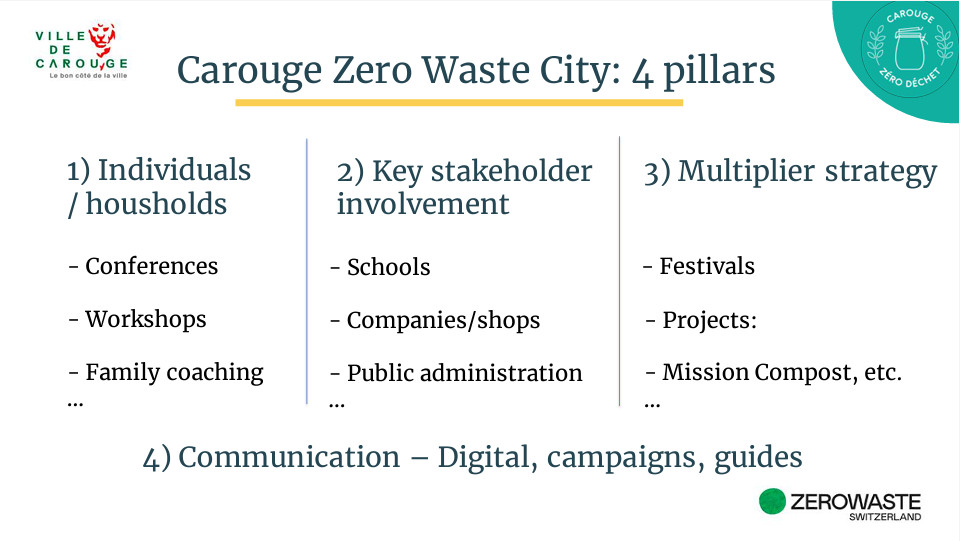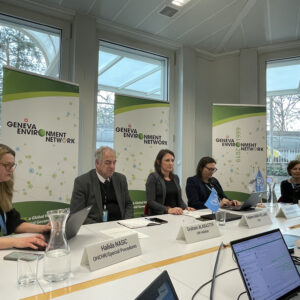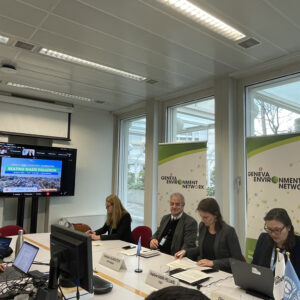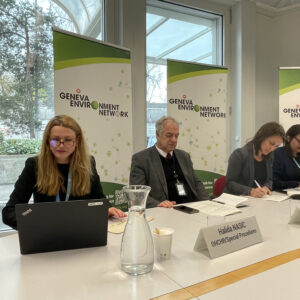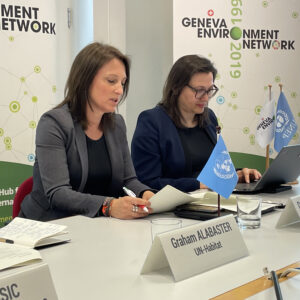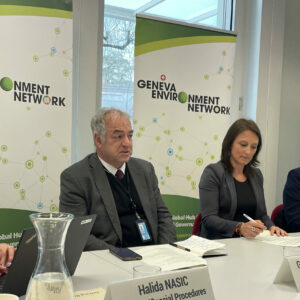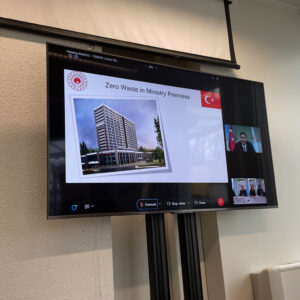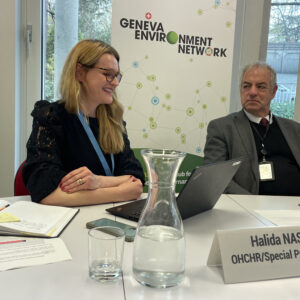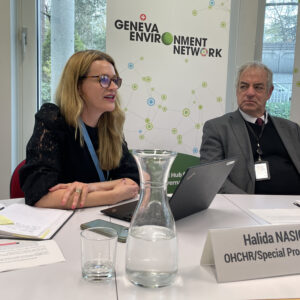Event Virtual
Beating Waste Pollution | Geneva Zero Waste Day Celebration

30 Mar 2023
13:00–14:30
Venue: Online | Webex
Organization: Basel, Rotterdam and Stockholm Conventions, Geneva Environment Network, UN-Habitat
International Day of Zero Waste, observed for the first time on 30 March 2023, aims to raise awareness of the importance of zero waste and responsible consumption and production practices and urban waste management contributing to achieving sustainable development. International Geneva plays a crucial role in moving this agenda forward.

About this Event
On 14 December 2022, the United Nations General Assembly at its seventy-seventh session, adopted a resolution proposed by Türkiye with 105 other countries, to proclaim 30 March as International Day of Zero Waste, to be observed annually. The resolution follows other resolutions focused on waste, including “End plastic pollution: towards an internationally legally binding instrument”, adopted at the United Nations Environment Assembly on 2 March 2022.
Promoting zero-waste initiatives through this international day can help advance all the goals and targets in the 2030 Agenda for Sustainable Development, including Sustainable Development Goal 11, on sustainable cities and communities, and Sustainable Development Goal 12, on responsible consumption and production. These goals address all forms of waste, including food loss and waste, natural resource extraction and electronic waste.
Geneva is a major global hub for the governance of hazardous substances, and home to several international organizations and multilateral environmental agreements aiming at reaching the zero waste goal. This event celebrated the steps taken by actors in international Geneva and beyond to move forward the zero waste agenda.
Speakers
By order of intervention.
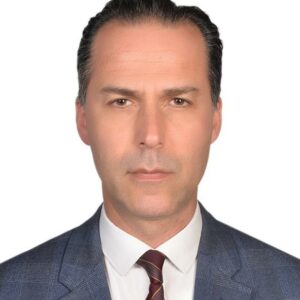
H.E. Amb. Güven BEGEÇ
Permanent Representative of Türkiye to the United Nations Office at Geneva and other international organizations in Switzerland

Graham ALABASTER
Head, Geneva Office, UN-Habitat

Rolph PAYET
Executive Secretary, Basel, Rotterdam and Stockholm Conventions
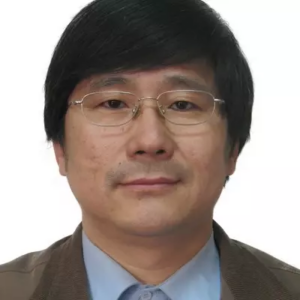
Jinhui LI
Professor, School of Environment, Tsinghua University, People's Republic of China | Executive Director, Basel Convention Regional Centre for Asia and the Pacific

Emre Cihan KAVLAK
Environment Expert, Ministry of Environment, Urbanization and Climate Change, Türkiye
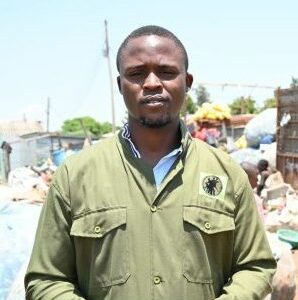
John Xavier CHWEYA
Chairman, Kenya National Waste Pickers Welfare Association

Warefta E MURSHED
Graduate Student Researcher, College of Natural Resources, Royal University of Bhutan

Sarah BLOOMQUIST
Director, Public Affairs at TOMRA Systems

Dorinda PHILLIPS
Geneva Manager, ZeroWaste Switzerland

Halida NASIC
Human Rights Officer, Special Procedures Branch, UN Human Rights

Delphine BABIN-PELLIARD
Senior Liaison Specialist Food Systems and Environment, FAO Liaison Office with the United Nations Office in Geneva | Moderator
Highlights
Video
Live on YouTube
Live on Facebook
Summary
Technical Welcome
Diana Rizzolio | Coordinator, Geneva Environment Network
We are all convening today, as last December, at the initiative of Türkiye, joined by 105 other member states, the United Nations General Assembly adopted a resolution proclaiming 30 March as International Day of Zero Waste, to be observed annually. This is therefore the first of many other Celebrations here in Geneva and around the World.
As Geneva is a major global hub for the global governance of hazardous substances, and home to several international organizations and multilateral environmental agreements aiming at beating waste pollution, we could not seize the opportunity to bring together some key stakeholders, involved in different processes and representing different stakeholders to discuss with us how they are moving forward this agenda.
Plastic pollution, food loss and waste, natural resource extraction, electronic waste, humanitarian waste, science to end pollution, toxics and human rights, waste pickers work conditions, are indeed some of the topics related to waste that are at the center of discussions and negotiations ongoing in multilateral Geneva, including achieving all the goals and targets in the 2030 Agenda for Sustainable Development related to this topic.
Opening Remarks | Geneva Zero Waste Celebration
H.E. Amb. Güven BEGEÇ | Permanent Representative of Türkiye to the United Nations Office at Geneva and other international organizations in Switzerland
The journey of the first International Day of Zero Waste has started in 2017 with the Zero Waste Project initiated by the First Lady of Türkiye, Emine Erdoğan. Mr. Kavlak from Turkey will give you more details about the project.
This project that the way came from a resolution linking Zero Waste to a wider 2030 Agenda. The level of ownership was encouraging in the UN, with 105 co-sponsors in its adoption. As the text is cross-cutting, we are confident that it can contribute to the implementation of 2030 Agenda, the New Urban Agenda, Paris Agreement, the Convention on Biological Diversity and the Basel Convention.
Today, the UN high-level meeting is being held at the General Assembly in New York, where the First Lady will address the audience as a keynote speaker. I hope events such as this will strengthen our efforts and raise high public awareness on zero waste.
Beating Waste Pollution
Delphine BABIN-PELLIARD | Senior Liaison Specialist Food Systems and Environment, FAO Liaison Office with the United Nations Office in Geneva | Moderator
FAO together with UNEP co-lead the measurement of the progress of the SDG target 12.3 on Global Food Loss and Waste.
In terms of figures, food loss and waste is responsible for an estimated 8 to 10 percent of global greenhouse gas emissions. Around 40 percent of the food continues to be lost in the supply chain after it is harvested. 17 percent end up wasted in retail and by consumers, particularly in middle and high income regions. In the meantime, globally around 800 million people — one in eight human beings — suffer from hunger and malnutrition.
These figures show that the loss and waste of food for human consumption directly impacts food security and nutrition, and in there, the realization of human right to food. It also leads to unnecessary pressure on the environment and a waste of resources that have been used to produce, distribute or conserve that food.
FAO supports members with food loss and waste, including capacity development, with the development of national strategies. We have also developed tools such as the Voluntary code of conduct for food loss and waste production and a guidance document on Enabling a legal environment for the prevention and reduction of food loss and waste. In 2019, we dedicated the FAO flagship report on the State of Food and Agriculture and we also have the Food loss and waste database.
Learn more on food systems, the environment and International Geneva in our dedicated update.
Graham ALABASTER | Head, Geneva Office, UN-Habitat
The story of waste and management started very early on in both UNEP and UN Habitat. Even when the SDGs were being discussed, there was initially some thoughts about how we would reflect this work.
UN-Habitat and UNEP worked very closely in the development of the indicators, particularly for SDG 11 for cities and SDG 12 for sustainable consumption production, and how they really go hand-in-glove, as the SDG for waste management or waste production comes under SDG 11, whereas recycling and sustainable consumption production is under 12.
Habitat for many years has worked on solid waste management, but only latterly did we start to consider more the Zero Waste context of recycling. One of our key initiatives that supports this work is the Waste Wise Cities Program, which was started in 2018. It is designed to assist member states particularly municipalities and cities, to quantify the amount of waste they produce, look at how, they can use that data to make decisions, and how they might network with other cities around the world to share experiences.
Because we know that waste management is a very important topic, we know that a lot of the work towards zero waste means about changing production and consumption patterns. We also know that for the waste that is discarded, we need much better knowledge on their recycling and reuse. For the bit that we can’t deal with, how we can dispose of it sustainably.
There’s very good reason, apart from environmental reasons, to also consider solid waste management and waste zero: municipal governments spend very large proportions of their budgets on managing waste. If there are ways we can reduce that budget, that money becomes available for other pressing urgent issues in education and other things. There really is a big driving force for cities to embrace the concept of waste and to see how they kick-started.
There is a lot of hope for us in UN-Habitat and UNEP because waste production happens in cities. As we look to 2050, close to two-thirds of the world’s population will live in an urban agglomeration of some kind.
We also know that many of those urban areas have yet to be built. 75% of the urban space that will be occupied in 2050 has yet to be built. We’ve got a real good opportunity now to influence the way urbanization goes ahead, and to embrace these concepts of zero waste right from the start, when these new urban settings will be established.
What does this mean in practical terms for local authorities? We’ve got resolutions adopted by the Environment Assembly, such as one on plastic and marine pollution, which are going to start to change policies, as have been so already in many cities. However, among those policies, one needs to dig deeper and look at some of the key elements, such as how we manage waste and its relationship with the informal sector. Most of the recycling and waste management is undertaken by informal sector actors. Finding ways to bring them into formal waste management policy at city level is one of the big challenges.
Finally, a last point is on the interconnection between the management of solid waste, drainage climate pollution. If you move into dense urban spaces, it’s very difficult to undertake sort of actions within just one area of departmental infrastructure. Because the way that solid waste is disposed, the way cities are drained, the way wastewater is managed.
All are critically linked together with solid waste management, we risk more flooding in urban settings because drainage is impacted. In fact, drainage systems, sewage systems, some rivers are the ways through which much of this domestic waste is carried to the oceans. We really need to look at the management of waste and in bringing Zero Waste policy in an integrated way. We can’t just look at solid waste without looking at drainage without looking at liquid waste management. It’s very important that we consider all these together.
Zero waste is a win-win strategy for everyone. It’s a real opportunity for cities to rethink their production and management of waste for the benefit of the environment for the benefit of the health, and to reduce the huge budgets that are currently spent on managing waste.
Learn more on Cities and the Environment in our dedicated update.
Rolph PAYET | Executive Secretary, Basel, Rotterdam and Stockholm Conventions
This is a very important day for us as it really brings the focus on the issue of waste, both at the international level and the national level. Thank you very much Türkiye for this foresight, and for this important decision to bring the issue of waste to the forefront of discussions we’ll be having in one month and a half at our triple COPs in Geneva.
Learn more on the upcoming 2023 Meetings of the Conference of the Parties to the Basel, Rotterdam and Stockholm Conventions in our dedicated update.
Here, we refer to the General Assembly’s resolution 77/161 which was adopted in December 2022, that echoes the voices of the parties of the Basel, Rotterdam and Stockholm Conventions that have worked very hard over the last 30 and 20 years, respectively, to protect human health and the environment from the harmful effects caused by hazardous chemicals and waste.
We have more than 2 billion tons of municipal solid waste accumulating annually, and we know that only 55% of this is managed by control facilities. We still haven’t accounted for 1 billion tonnes of municipal solid waste, which is somewhere degrading and leaching into the environment, into our rivers, our oceans, and our coastal regions, which have severe impacts not only on human health, but also on wildlife and the health of our environment.
We have over 14 million tons of plastics still entering the aquatic ecosystems, and they’re echoing the efforts and international level to negotiate an international treaty on plastic waste to reduce this growing trend. This is not counting the hundreds of tons of electronic waste, waste containing toxic substances and other types of types of waste that is continuously being deposited into the environment.
The Basel Convention on the control of transboundary movements of hazardous wastes was adopted in 1989. Over the years, it has worked in several areas, identifying how we can as individual member states and Parties to the Convention address the issue of waste. One of the strategies which looked at how we can effectively minimize and prevent waste was the strategies adopted at the Cartagena Declaration on the prevention of minimization and recovery of hazardous wastes and other wastes in 2011.
The Basel Convention has also taken important decisions. In 2019, Parties adopted the Plastic Waste Amendments, which is aimed at better addressing the issue of plastic waste. In 2022, the COPs also adopted the E-waste Amendments to address the issue of electronic waste. As we noted, a large number at about 17 million tons is generated, and only 17.4% of those reach recycling facilities. There is a lot of work for us to do in this area.
Now over the years, the Conference of the Parties of the Convention has also established partnerships, such as the Mobile Phone Partnership Initiative (MPPI), the Partnership for Action on Computing Equipment (PACE), the Household Waste Partnership, and the Plastic Waste Partnership. I’m currently looking at a follow up partnership to computer equipment, which aims at facilitating the implementation of the Conventions, working both with the private sector, the local governments, countries, parties, NGOs, in trying to find solutions. As we’ve all learned, each situation is very different, based upon cultural, economic, social issues. We have to bring the solution of waste down to the local level.
The Stockholm Convention on persistent organic pollutants has also contributed to reduce waste by removing from the lifecycle of products, very toxic chemicals which we call persistent organic pollutants (POPs) and removing them from human production. While the Stockholm Convetion has been instrumental in removing some of these chemicals from our consumption and production products, there’s still a lot of work that needs to be done. There are still thousands of chemicals that need to go through the scientific process in terms of identifying the impacts on human and wildlife and seeing whether they need to be managed and regulated, and, in many cases, phased out under the Stockholm Convention.
It is my expectation and hope that the annual observance of the International Day of Zero Waste will contribute to raise awareness at the political level, local level, and international level, on the urgency to address the issue of waste generation by promoting sustainable production and consumption patterns that is dealing with the matter upstream, but also looking at how we can shift our thinking on circularity, and in so doing, contribute to addressing the triple planetary crisis of pollution, biodiversity, and climate change.
Jinhui LI | Professor, School of Environment, Tsinghua University, People’s Republic of China | Executive Director, Basel Convention Regional Centre for Asia and the Pacific
We appreciate the opportunity on the UN International Day of Zero Waste to outline progress regarding the Chinese practice on zero waste, and the work on the international network of Zero Waste Cities Initiative by BCRC China.
In China, for beating waste pollution, the State Council in 2018 issued the work plan for the Zero Waste City pilot program. The Zero Waste City in China refers to a development model that aims to reduce generation and promote recycling of solid waste, reduce waste sent to landfill, and minimize the environmental impact of solid waste, thus promoting green development and lifestyle. After a two year pilot period, China has carried on the construction of zero waste cities in 113 cities and eight special regions. The Basel Convention Regional Centre for Asia Pacific has contributed to this work, and has taken planning and technical support for zero waste facility construction.
One of the key principles of the Basel Convention is the reduction of waste generation and the promotion of the management of hazardous waste and other wastes. As such, the objective of Basel Convention is fully consistent with Zero Waste Initiative. The international network can assist in achieving the objective of the Convention by letting cities implement zero waste strategies.
At the Zero Waste City High Level Forum in June 2020, BCRC China drafted a declaration on promoting zero waste facility construction. Subsequently, BCRC China comes out with a declaration with relevant cities worldwide to commence the establishment of the International Network of Zero Waste City Initiative.
BCRC China invites interested cities to join the network, which has gotten written support from various cities, and other BCRCs. In addition during these two year period 17 cities and two regions and the four BCRCs have exchanged experience with the Zero Waste Cities Forum by BCRC China.
The international network has been planned to comprise of member cities, scientific bodies, expert bodies, and a subsidiary committee of industry representatives. BCRC China will temporarily act as the Secretariat of the network.
The network was facilitated with the following activities with an open window to the needs of the series. First is to deliver a report and newsletter on the progress of the zero waste city’s construction to organize webinars to exchange experiences. The second is to verify and evaluate the solid waste management technology to assist the technology transfer, and to organize the supply and the demand matching meeting between local government and industry. Third is undertaking research on zero waste scientific issues and to apply for funding for an implemented zero waste city pilot project. Fourth is to undertake adequate training and awareness raising.
It is hoped that this network cities can work together to promote the process of international Zero Waste construction, reduce the generation of waste and promoting events or the management of waste.
Emre Cihan KAVLAK | Environment Expert, Ministry of Environment, Urbanization and Climate Change, Türkiye
When we talk about zero waste, we are talking about an approach to resource and waste management based on circularity. It promotes sustainable production and consumption habits and encourages the efficient use of resources.
Zero waste is a target defined as waste management philosophy that involves preventing the wastage, using the resources more efficient, reviewing the reasons of waste formation — preventing or minimizing it, and collecting waste at source separately for a suitable recycling or recovering process. Understanding zero waste means preserving and recovering all resources instead of sending them for landfills or burning them.
In order to avoid wastefulness, advocate for the prevention, reduction, reuse and recycling of waste, and achieve positive socio-economic outcomes including the development of social solidarity, a project for the implementation of Zero Waste is needed.
Türkiye is among the countries at the forefront of the zero-waste movement. In 2017, under the leadership of H.E. Madame Emine Erdogan, the First Lady, Türkiye launched its zero-waste project to highlight the importance of sound waste management and reform consumption patterns to achieve the environmental dimensions of the Sustainable Development Goals, especially in fighting the climate crisis.
In order to establish a zero waste management system; It is required to implement at least a double collection system and support it with civic amenity centers. In Türkiye, Zero Waste Certificates are given to buildings, premises and local authorities in order to establish zero waste management system according to the criteria determined by Ministry.
We have 11 guidelines prepared by the Ministry of Environment, Urbanization and Climate Change in order to guide the realization of the works related to the establishment, operation and monitoring of a sustainable zero waste management system.
Since we first started the implementation in 2017,
- Our recovery rate has increased up to around 27 %.
- 19 million people received training within the scope of the project.
- We achieved an economic gain of 62 billion Turkish Liras.
- Nearly 120,000 buildings and 96 municipalities received certificates
- Zero waste system is installed in 164,000 buildings/campus.
We aim to increase the recovery rate of our country: from 13% in 2017 to 60% by 2035 with zero waste implementation.
To summarize the progress of our Zero Waste implementation:
2018
Zero Waste Information system put into use. Implemented charging for plastic bags.
2019
Regulation on Zero Waste was put into force to determine the general rules and principles on zero waste management. Zero waste blue was initiated. Zero waste was included into the 11th Development Plan.
2020
11 zero waste guidelines were prepared. Türkiye Environment Agency was established. Turkish Environmental Law was revised acdg. to Zero Waste necessities.
2021
Action plan (with 81 actions) was prepared with the joint agreement of all Ministries; Green Deal Action Plan was published, as within the scope of EU Green Deal. Paris Agreement was also ratified.
2022
UN resolution 77/161 on International Day of Zero Waste was adopted.
2023
First celebration of International Day of Zero Waste.
We wish to continue our work together without slowing down in the future.
The main highlights of the Resolution can be summarized as:
- Requesting to set up an advisory board to promote local & national zero waste initiatives through dissemination of best practices and success stories
- Recommending the continuation of the discussion on zero-waste initiatives.
- Encouraging member states, organizations of the UN system and other international and regional organizations
- Declaring March 30th as International Day of Zero Waste.
I would like to end my words with one of the slogans of the Technical Assistance Project for the Evaluation of Turkey’s Potential for Transition to a Circular Economy (DEEP), started in 2022, which is closely related to our Zero Waste efforts, carried out with the EU IPA funds:
A livable world with circular economy and green development.
For your further comments and questions please do not hesitate to get in touch with us our e-mail address is sifiratik@csb.gov.tr.
John Xavier CHWEYA | Chairman, Kenya National Waste Pickers Welfare Association
Because of the job we do and the inequalities that we normally face, we waste pickers have been rising and trying to unite. This is a movement that is not only happening in Kenya but across the globe.
Our unity is mostly based on changing some of the inequalities that we face. After multiple joint discussions from Kenya where we brought on board waste pickers, we came to an agreement to form and create a national umbrella where the welfare and the rights of waste pickers will be represented.
Achievements made by the Association
Organizing and uniting waste pickers of over 26,000 waste pickers (WP). Nairobi has one of the biggest memberships of the National Association, as in Nairobi alone, we have more than 15,000 WP from the households, streets, companies, and the majority being those that live in the dump sites where most of the waste goes.
Initiating discussions with county governments to recognize and support waste pickers. Because of the nature of devolved governance in Kenya, this forms one of our biggest challenges. Local and national authorities have been passing and enforcing a lot of policies that directly affect our livelihoods without having our voices considered on the table. This is one of the things that forms the basis of the fact that we came together to unite. In such engagements, waste picker leaders lead meetings on a local level to discuss on ways that we are going to solve or push for the solutions whether on a personal level or on a community level. Local leaders that directly have a seat at the table affect the job that we do every day.
Fundraising for PPEs, raising funds for colleagues working at the dumpsite. The photo below shows one of the biggest dump sites in Kenya, the Dandora dumpsite. From this picture, you can quickly see that the health issue we face is something clear, that no local, national, or global authority can assume or pretend not to see. In this dump site, we have more than 1,000 members living in this dumpsite, alongside their families.
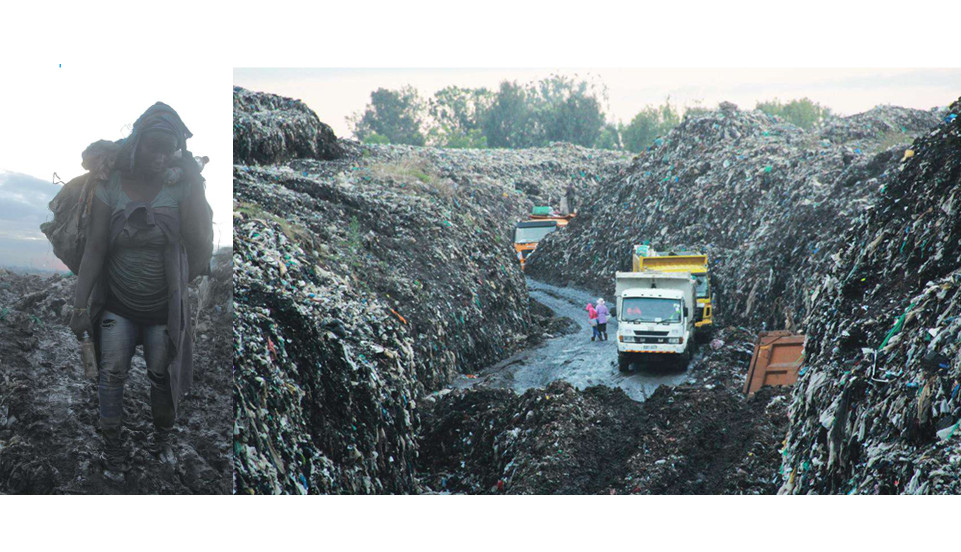
One of the biggest problems that we are facing right now is tied to health. Most of our members are not in a financial very good financial position to also kind of seek better medical attention. Though we cannot say for sure that most of these health symptoms and diseases such as cancer, we know for sure that there are some cancerous symptoms that we see, especially with what we interact with every day, including toxic plastics, that form a very big part of our environment and workstation.
Most of the plastic that is single use currently has no value to waste pickers. All the recyclable plastic that comes to the dumpsite, we always take and have them taken into a recycling plant to get some little value out of it. As such, we started a Facebook fund drive that allowed us to fund pairs of PPE, such as gum boots and gloves to help reduce some of the health cases we are having. We tried to also give them to the most vulnerable those that already have symptoms of diseases. These diseases are mostly like being contracted because we handle waste without PPEs.
Regular community clean-ups. We also conduct regular clean-ups, something that we started long ago. I started working and living in the dumpsite when I was 13 years old, and now it’s been 18 years since I started doing this job. Over this time, we’ve been doing a lot of clean-ups, and we’ve been reclaiming a lot of waste trying to get some value out of it. These regular clean-ups are things that we do not because we are environmentalists, but because this is our job.
This aspect shows that waste pickers have that historic depth. However, one of the challenges we face is the social stigma. We face a lot of harassment from the authorities from the police and from local and national authorities. Because of the kind of life we live and the job we do, we are always dirty. There’s no way that in such an environment you’re going to be clean. Because we’re also not privileged enough to access education, most of us don’t really get a chance to have that basic education to be in a better place to engage with the authorities. It means that we have to sacrifice a lot before we can attain basic education.
International Waste Pickers Day. As such, we’ve been engaging with both the local and the national governments and conducting marches, such as on 1 March, where we also had a press statement. This is a very important day for us, a day where for the first time we bring together other waste pickers and show some of our colleagues the inequalities others face up to today, though in many different ways. We are already on our way. We are already progressing on ways to change the situations that we live in. On 1 March, through the marches around the city, we are also trying to tell policymakers that we have an integral job to our cities and our environments. The job we do is being recognized but not the people who are doing it.
Active engagement in networking and lobbying. We’ve also been actively engaging and being part of the networking and lobbying work in UNEA 5.2. We are also organizing an International Alliance of Waste Pickers where waste pickers across the globe come together to support other organizations, to properly organize, and to actively and effectively engage with policymakers on global platforms.
Such platforms like UNEA have given us opportunities to directly engage with our leaders. These were people that, as a waste picker, I could not access and talk directly to them as they do not necessarily understand our reality. When policies are being made without the voices of the people that these policies are going to affect, there’s a problem.
Being part of this call and being part of the global policymaking processes is something waste pickers don’t take lightly because we are literally being called to be on the table. These are tables that directly affect not just our lives, but also the lives of our families and future generations.
As such, we have a vision. Waste is generally a global war. At the heart of what I would like to say is waste pickers are at the forefront of this war because they have the historic knowledge and depth in managing this waste. Past 30 years, and past 50 years, I think this is more than enough time to consider our good expertise.
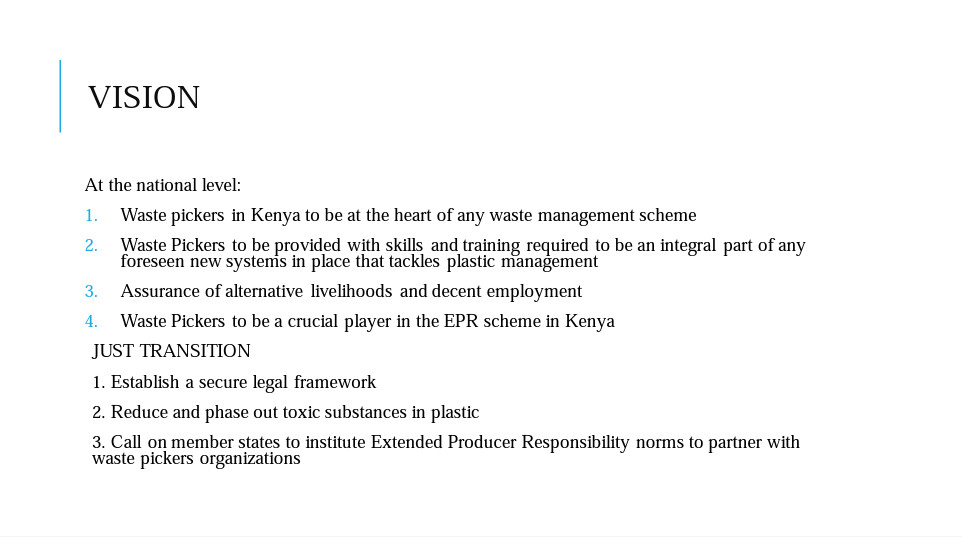
Advancing Zero Waste Action
Warefta E MURSHED | Graduate Student Researcher, College of Natural Resources, Royal University of Bhutan
I started my journey of waste in the ship‑breaking industry. When I saw women, especially pregnant women, working there, dealing with different kinds of waste, with harmful substances.
As a woman, I have always seen that whenever we talk about consumption, production, and awareness, or any sort of practices, two major groups can always lead: women and youth. Children and youth have been coming to the forefront recently. The consequences of climate disasters and waste problems that we are facing are two or three times worse than what our past generations faced. As a mother or woman, it is important to consider what we are giving to the next generation.
Especially in developing countries, women are often managing households, and knowingly or unknowingly, they are segregating waste, both in industries like the garment industry in Bangladesh and at the household level. Despite their involvement, women often lack capacity building, proper assistance, and most importantly, safeguards for their work in the waste sector.
Youth, or “Tokai” as we call them in Bengali, range from around 12 to 25 years old and are also involved in waste collection and segregation. However, they too lack proper training and guidance. Women, youth, and children all play a role in waste segregation, but their efforts are not always recognized, especially by local governments. In our country, 90% of women are involved in the waste segregation and management sector, and they unknowingly contribute to a circular economy. In landfills in Dhaka, women work with their bare hands and only earn minimum wage of two dollars per day.
Most of the time Men aren’t part of this, leaving the burden on women and youth who, despite their efforts, are not given proper recognition or support. In conclusion, it is crucial that we have more strategies to involve women to build their capacity, to train them. In general, if we can inform them more in regarding the area, they are working maybe they would know how to segregate, where to segregate, because now they are getting directly or indirectly contaminated, and they are getting lots of diseases. That’s what we are seeing in the landfills.
During natural disasters, landfills become even more toxic and a source of dangerous diseases. With limited access to medical treatment, it’s vital to not only provide capacity building and training for women and children, but also address their treatment and well-being in these sectors.
When it comes to policy, we must bridge the gap between knowledge and implementation, ensuring that policies reach the local level and directly impact women and youth. We aim to be that voice and to reach out to these communities.
For example, we have undertaken a project in Bhutan, which we hope to replicate in Bangladesh and Nepal, where we upcycle plastic waste into construction materials while involving youth and women. These types of projects require promotion, assistance, capacity-building and training. We have addressed communities affected by plastic pollution and trained women in waste segregation. We also visit local schools to educate children and youth about what to do. We engage with university students to connect them with what happening at the policy level.
We need more support for the voluntary work women and children are doing in the waste management sector. Women who work in this field see it as a money-making opportunity, earning only a minimal wage of two dollars per day. Youth often earn even less. We want to establish a strategic setup and procedure for a systematic approach. We want to provide them with proper knowledge on waste management and thus prevent contamination in various sectors of the ecosystem.
In conclusion, to successfully combat waste pollution, we need to build capacity for women, children, and youth.
Sarah BLOOMQUIST | Director, Public Affairs, TOMRA Systems
The Holistic Resource System combines global best waste management practices in terms of tackling plastic pollution, promoting the circular economy, and reducing greenhouse gas emissions. If we all collaborate to accelerate the implementation of these proven systems, we can make a massive contribution to sustainability on this planet.
TOMRA is a global technology leader focused on sensor-based solutions for optimal resource productivity in the food, mining, and recycling industries. Our vision is to lead the resource revolution, and we believe that businesses have the power and responsibility to help sustainably manage our planet’s precious resources. Around the world, we have a global presence as a leader in recycling technology. With 50 years of experience in the recycling value chain and over 100,000 systems installed across more than 100 countries. We have a strong foothold in Europe, largely thanks to the implementation of progressive waste policies such as the Single-Use Plastic Directive.
Here’s a snapshot of two of our key solutions for collecting and sorting materials. On the left, you see a reverse vending machine used in regions with deposits on beverage containers, which are returned to the consumer when they bring back the container. On the right, the orange box is an optical sorting solution commonly used in Material Recovery Facilities (MRFs), where household recycling is sorted and processed. These solutions reduce litter and the demand for virgin resources.
What is the Holistic Resource System (HRS)? We asked ourselves what we could achieve if we combined the proven best practices in waste management and implemented such a system globally. The TOMRA Holistic Resource System optimizes the combination of key waste management practices for collection, sorting, and recycling to transition towards closing the loop, preventing linear waste, and contributing to a carbon-neutral world.
A quick snapshot of the current problem shows that only about 14% of plastic packaging is collected for recycling globally. Most of this is recycled into lower-quality products, and only 2% is recycled in a closed loop.
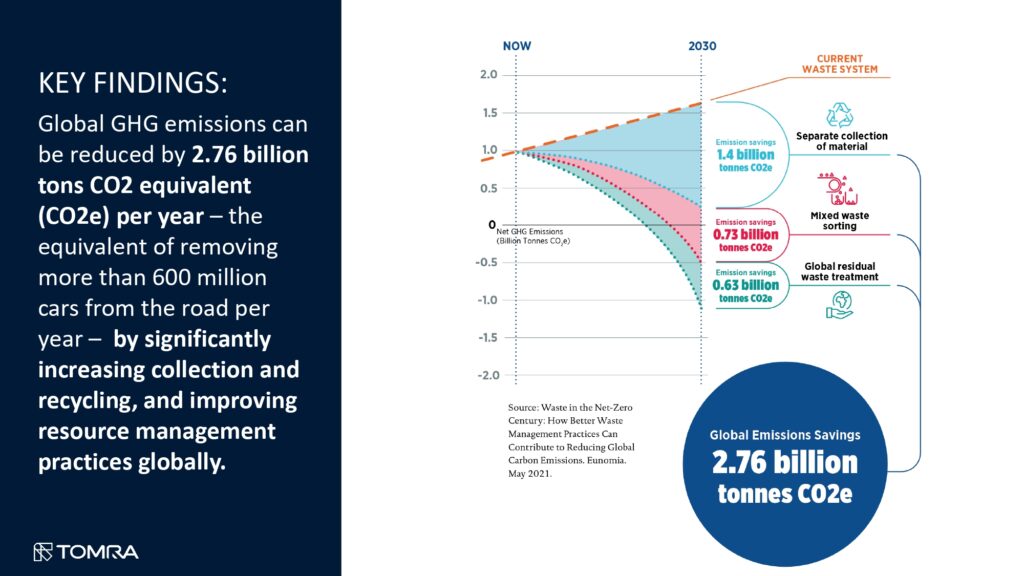
Some of the key findings from this report show that nearly three billion tons of CO2 equivalent per year, compared to current waste disposal methods, could be saved if we put these systems into place. That’s the equivalent of taking more than 600 million passenger cars off the road annually. This is done by significantly increasing collection, sorting, recycling, and improving resource management practices globally.
The Holistic Resource System consists of the following three components:
- Deposit return system
- Separate collection of certain materials
- Mixed waste sorting prior to disposal at the landfill
If implemented together, these components have the potential to increase recycling rates and accelerate the transition to a circular economy.
Let’s take a quick look at these three systems:
- Deposit return system is common in Europe and some parts of the US, Canada, and other regions around the world. We put a small but meaningful deposit on the sale of each beverage, which is paid back to consumers when they bring the container back. The deposit system is typically established through legislation and achieves high rates for collecting containers, around 90% in high-performing systems, greatly outperforming curbside systems.
- Separate collection of certain materials. The best-performing municipalities have source separation of specific waste streams such as organic waste, paper, textiles, e-waste, and glass. Source separation of these materials helps to increase recycling rates, drive circularity, and reduce greenhouse gas emissions. A key point here is that separate collection of plastics isn’t necessarily required and depends on the location. However, relying just on source separation for the recovery of plastic is not enough for a high-performing system.
- Mixed waste sorting prior to disposal at the landfill. By adding this third element, we can reach the full potential of plastic recovery. Mixed waste sorting is a final stage solution for recovering recyclable materials like plastics, metals, and paper before residual waste is incinerated or sent to the landfill. It serves as a recovery backstop for materials not captured in the deposit return system or separate collection and is essential for mitigating climate impacts.
For example, in Norway, a 2019 study from Deloitte found that municipalities that sorted plastic out from residual waste at mixed waste sorting plants had two to five times higher recycling rates than those that did not. In practice, Norway has state-of-the-art mixed waste sorting plants that recover up to 90% of the targeted plastic with a high purity rate of around 95%.
Another example is an industrial-scale demonstration plant we opened in Germany in 2021, a joint venture with Borealis. The goal was to prove that advanced mechanical recycling with enhanced steps to traditional recycling makes it possible to create virgin-like recycled plastic pellets from both source-separated streams and mixed waste resource streams. There’s a huge demand for recycled content driven by brand goals and legislation. By combining advanced mechanical recycling with mixed waste sorting, we can unlock recovery potential and produce high-quality feedstocks.
Policy plays a critical role in all of this. The implementation of the Holistic Resource System addresses plastic pollution, promotes a circular economy, and reduces greenhouse gas emissions, but it requires a strong policy framework. The most effective policy approach we see is Extended Producer Responsibility (EPR), which ensures producers are legally responsible for the environmental and social aspects of their products and pay for the recovery of materials. Well-designed EPR includes targets for recycling and recycled content, driving circularity.
In summary, the Holistic Resource System maximizes recovery of all materials through the implementation of deposit return systems, separate source collection, and mixed waste sorting prior to landfill or incineration. To accomplish this a strong policy framework based on the principle of EPR is key.
TOMRA is an active member of the Business Coalition for a Global Plastic Treaty, facilitated by Ellen MacArthur and the WWF. We will continue to participate in these meetings, with the next one being in Paris in May. We call for the UN Treaty on Plastic Pollution to enforce mandatory policies to generate fair, long-term economic drivers to end plastic pollution and keep plastic in the economy at its highest value for as long as possible.
Dorinda PHILLIPS | Geneva Manager, Zero Waste Switzerland
The way we look at the Zero Waste Movement is about creating enabling conditions and showing people the concrete actions they can put in place to reduce waste and clearly preserve natural resources, biodiversity, and reduce carbon emissions. Today, we produce a huge amount of waste, and the waste that we see is just the visible tip of the iceberg. If we can reduce waste, we reduce the natural resources we’re using, we reduce the carbon emissions that are being produced.
The zero waste approach is trying to listen to how we can reduce waste at the source, starting before recycling. In Switzerland, we have a recycling rate of around 50%, and so we’re looking to see how we can even avoid it in the first place. We typically talk about things that we can do for individuals, but these are also for companies and manufacturers as well:
- Refusing things you don’t need, such as advertising in the letterbox, or rethinking products, such as having companies design the product differently from the beginning so it doesn’t create any waste;
- Individuals can reduce the number of things we’re buying clothes, gadgets, etc., and companies can reduce unnecessary packaging
- If we can reuse, repair and reshare, and if consumers get back into the habit of reusing cloth bags and their own containers, they can use these for the next 20 years;
- Rotting (composting) and recycling afterward play an important part as well.
What we typically see is that people, in starting to change their habits, start with reducing their packaging waste but they go on to reduce food waste, energy waste, transport emissions, etc. It’s really about reducing the environmental footprint.
With regard to zero waste associations, in Switzerland, we’re providing concrete solutions on the ground. We do events, workshops, conferences, coaching programs, guides, and projects. All of the things we do are for municipalities, companies, school shops, for restaurants, among others here in Europe.
We also have Zero Waste Europe, which is an organization that connects 35 national and international NGOs with a huge focus on influencing EU policy from product redesign to waste disposal. We also have the Zero Waste Cities program, with many cities across Europe that have joined, and the Mission Zero Academy which certifies the cities. They’re also a member of a number of different alliances such as the Global Alliance for Incinerator Alternatives and Break Free from Plastic Pollution and Rethink Plastic.
Today, I will discuss the Zero Waste Cities and the school project.
Zero Waste City Carouge
Carouge is a town in the Canton of Geneva with 23,000 inhabitants. We already have 50% recycling rate, and compost systems in place. The goal was to see how we could help people change habits and look at how to avoid waste in the first place. We’ve been working with the cityfor about four years, starting in 2018. We put a program in place with four pillars.
On results, we look at results on four levels.
- Participation. Throughout the four years, there was excellent participation.
- Over 6,500 people came to the activities. 6 schools joined the Zero Waste School Program. Virtually all the shops put up signs that say they accept people’s own containers. 75,000 visitors to the website.
- Large reduction in waste among early adopters, which is about 15 to 20 percent of the population who are going to be the first to change. After the workshops, we saw that individuals were reducing anywhere between 30 to 90 percent of their incinerated waste. In the first family coaching program we did, we accompanied 24 families over a period of six months to show them how to reduce waste. They reduce their waste by 63 percent on average. The second group of 20 families was just by 43 percent during COVID, which was pretty impressive as well. All of the big festivals and school events across the city have reduced between 50 and 90 percent with help and guidance. Public administration waste was reduced a lot, but they also put a big focus on paper where they reduced about two tons of paper a year.
- Marked reduction of official waste statistics across the whole town. Our reduction of waste of about 8.5 percent of incinerated waste, which is about 12 kilograms per person, a huge number that is a lot higher than the average. We’re seeing companies have reduced their waste by about 15 percent, and that represents savings of about CHF 80,000/year for just incineration for Carouge.
- Broader impact across other areas where people reduce the impact. We did studies to show that people tend to buy more locally, where they buy from local producers and reduce their meat consumption, etc.
My Zero Waste School
The project is primarily for primary schools and typically what we do is accompany primary schools over a 9-12 month period. We also give teachers a toolkit so that they can put the activities in place themselves. The objective is to teach pupils zero waste habits for life, engage the whole school in reducing waste and environmental footprint, and reach families.
With presentations, we do a half-day training for all the teachers, where they can put 45 activities in place in their classrooms during the year. We do four coaching sessions of the Green Team throughout the year, so they can put three to four activities in place for the whole school. Then, we do an evaluation at the end. The idea is that the pupils hear the messages repeated multiple times and are surrounded by a whole community reducing waste: we get to real behavior change.
The toolkit we give has 20 ready-to-go activities for the teachers, including 4 fact sheets to give them the background, and materials such as games, photos, communication material, etc. The results are very positive as we receive feedback from the teachers, schools, families saying they love it. Schools do an event or do a challenge to reduce their waste by about 50 percent.
It’s absolutely possible to reduce waste if we show people how to avoid waste in the first place. More information on any of this can be found on Zero Waste Switzerland or Zero Waste Europe websites.
The best waste is the waste that is actually never produced in the first place.
Halida NASIC | Human Rights Officer, Special Procedures Branch, UN Human Rights
Let me start by recalling the UN Secretary-General Antonio Guterres and his report ‘Our Common Agenda’ stating that, “our climate, our environment and our planet are critical global commons that must be protected for all people, now and in the future.”
How can then human rights contribute towards advancing zero waste efforts?
- Significantly, international human rights law and standards outline obligations for States and rights for individuals and groups. UN human rights mechanisms that the UN OHCHR supports (treaty bodies, the Universal Periodic Review and the Special Procedures) have for decades applied international human rights law to a range of environmental issues. Environmental harm interferes with the full enjoyment of a wide spectrum of human rights, including the rights to life, the right to health, clean water and sanitation, among others. These standards provide clear obligations of States to respect, protect and to fulfill human rights on issues linked to the environment. More recently, the UN Human Rights Council (A/HRC/RES/48/13) and the UN General Assembly (A/RES/76/300) have recognised that everyone, everywhere, has the right to a clean, healthy and sustainable environment.
- The special procedures system consists of 59 thematic independent human rights experts, including the SR on toxics and human rights, appointed by the HRC to monitor human rights around the world, engage in dialogue with States and stakeholders, and issue recommendations on human rights issues relevant to toxic substances and hazardous waste.
As to the UN Special Rapporteur on toxics and human rights – this mandate was created in 1995 to examine the human rights implications of toxic and otherwise hazardous substances. The mandate expanded in 2011 beyond the issue of waste, taking a lifecycle approach to issues presented by hazardous substances (A/HRC/RES/18/11). As a result, the scope of the mandate includes: extractive industries; labour conditions in manufacturing and agricultural sectors; consumer products; environmental emissions of hazardous substances from all sources; military activities, war and conflict; and the disposal of waste. In 2020, (resolution 45/17) the Human Rights Council requested the Special Rapporteur to continue providing detailed, up-to-date information on the adverse consequences for the human rights of managing and disposing of hazardous substances and wastes in an unlawful manner.
The current mandate holder Mr. Marcos A. Orellana was appointed in 2020. Dr. Marcos A. Orellana is an expert in international law and the law on human rights and the environment.
The working methods of the Special Rapporteur, include (i) country visits; (ii) thematic reports (one to the UN General Assembly and one to the HRC), and (iii) communications i.e. letters to States asking questions on issues relevant to the mandate.
- As to country visits, since 2020, the Special Rapporteur Marcos Orellana has visited Ghana, Italy, Mauritius, Paraguay, and also the International Maritime Organisation. This year the SR’s visit to Australia has been confirmed.
- In terms of the Special Rapporteur’s thematic reports, these have included: (i) The impact of toxic substances on the human rights of indigenous peoples; (ii) Mercury, small-scale gold mining and human rights; (iii) The stages of the plastics cycle and their impacts on human rights; (iv) the right to science in the context of toxic substances. This year’s thematic reports focuses on the toxic impacts of some climate change solutions, and ships generated waste.
In regard to waste, throughout his work, the Special Rapporteur has assessed implementation and gaps in the legislation for the sound management of chemicals and waste, including the existence of national policies to manage the entire lifecycle of chemicals and waste and prevent exposure to hazardous substances. The Special Rapporteur addresses and welcomes progress and good practices in countries in this regard, including efforts on the application of the Basel, Rotterdam, and Stockholm Conventions.
The Special Rapporteur has addressed issues including waste and hazardous waste, ranging from electronic, plastic, textiles, and organic waste, accumulate and contaminate sites posing serious human rights concerns. He has found that Individuals and communities around the world continue to suffer from adverse health effects ranging from miscarriages, birth defects, heart and lung impairments, cancers, among others, that are linked to toxics and hazardous waste. The Special Rapporteur observes that, in general, children, indigenous peoples, low-income communities and other marginalised groups are disproportionally affected.
What are then the obligations of States and responsibilities of businesses to address toxic waste?
- In his report on States’ duty to prevent exposure: the SR stated that no State will meet their obligations to protect, respect and fulfill human rights without taking greater measures to prevent exposure from hazardous waste and substances. People are knowingly exposed to a multitude of hazardous substances that could be prevented. Personal autonomy over what enters our bodies has steadily eroded over decades of industrialization and chemical intensification, to such an extent that few people have information about their actual exposures, let alone the power to prevent it.
- Businesses have a responsibility to respect the human rights that are implicated by their activities, supply chains, products and policies. The toxic footprint of businesses across numerous sectors is resulting in human rights abuses, particularly for vulnerable groups. Fundamental to this responsibility is human rights due diligence in the area of toxic chemicals, pollution and waste.
To conclude, the important objectives of a zero waste approach fundamentally promote also a zero hazardous waste, and contributes to the implementation of the SDGs and States’ human rights obligations. The Special Rapporteur appreciates the continued collaboration and engagement and stands ready to engage in dialogue with States and all stakeholders to advance awareness, celebrate achievements, point out areas for improvement and is available to provide continuous technical support to address those challenges.
Gallery
Documents
Presentations made during the event

